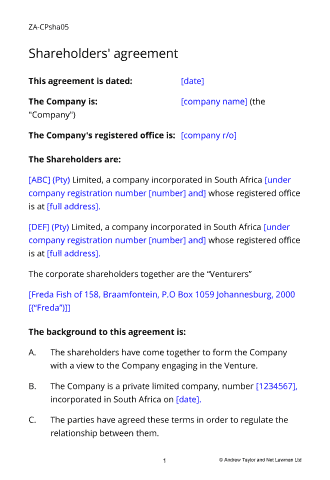Shareholders' agreement

Document overview


- Length:19 pages (5065 words)
- Available in:
 Microsoft Word DOCX
Microsoft Word DOCX Apple Pages
Apple Pages RTF
RTF

If the document isn’t right for your circumstances for any reason, just tell us and we’ll refund you in full immediately.

We avoid legal terminology unless necessary. Plain English makes our documents easy to understand, easy to edit and more likely to be accepted.

You don’t need legal knowledge to use our documents. We explain what to edit and how in the guidance notes included at the end of the document.

Email us with questions about editing your document. Use our Lawyer Assist service if you’d like our legal team to check your document will do as you intend.

Our documents comply with the latest relevant law. Our lawyers regularly review how new law affects each document in our library.
About this document
This document is for a situation where two or more shareholders are forming a new company to work together on a project which may be of any length, but is intended to have an end date.
This may be a project to develop a property, engage in property dealing, set up a website for sale, or buy a company specifically to sell off its assets.
The shareholders may or may not be directors. Their contributions of time, money, expertise or use of assets and intellectual property may be different. One or more may work part time or not at all. One may be a “hands off” lender.
Shareholders' agreements set the ground rules for the relationship between shareholders. Mostly that means protecting the interests of one or more shareholders against the others. The directors operate a company and make the decisions, but the directors operate only in accordance with the instructions of the shareholders to whom they are accountable. Furthermore, to the extent that shareholders are also directors, they are bound to the terms of an agreement they have signed as a shareholder. So this means that it is really important to have a watertight shareholders agreement.
The document includes provision for valuation of the shares of a departing shareholder by reference to a valuation based on your instructions to an accountant. The valuation depends on the parameters used, so your instructions are critical. We have provided a comprehensive version which you can edit according to the deal you wish to strike with a selling shareholder.
The law in this shareholders’ agreement
The law in this shareholders’ agreement is based on both company law and contract law. Within the structure of company law, you can choose the terms that best suit your situation, so you do not need to study any particular law to be able to edit your shareholders’ agreement. The agreement is up-to-date and very comprehensive.
When to use this shareholders’ agreement
This agreement is suitable for any private company, no matter what its business. It is about rights, power, control and safeguards, not about your business.
A company’s shareholders agreement can be redrawn at any time, but is commonly done when the relationship between the shareholders and the directors changes.
Shareholders’ agreement features and contents
No other shareholders’ agreements for sale on the Internet are in plain English or are so comprehensive in their cover of legal issues and the drafting explanations and tips supplied. Net Lawman’s slogan “Real law, in plain English” is as true of this document as of any others.
In many areas, we give you complete alternative paragraphs and explain in the notes when each will be the most suitable for you.
This document contains over twenty commercial paragraphs as well as what you might call technical legal provisions. You can choose which are suitable for your needs. Many are based on our practical experience as solicitors of dealing with shareholder disputes.
Contents
- obligations of the company to the shareholders (the company is also a party to the agreement);
- roles of directors and actions by the company or a director which require shareholders’ consent: controls and redistributes power between shareholders so that majority shareholders cannot force decisions;
- list of actions that require all shareholders’ consent
- how to deal if deadlock occurs
- how to deal with new intellectual property;
- transfers of shares and rights of pre-emption: when allowed, under what conditions and to whom;
- termination of this agreement
- publicity about the deal;
- confidentiality;
- use of a shareholders own assets in the business;

Recent reviews
Choose the level of support you need
Document Only
This document
Detailed guidance notes explaining how to edit each paragraph
Lawyer Assist
This document
Detailed guidance notes explaining how to edit each paragraph
Unlimited email support - ask our legal team any question related to completing the document
- Review of your edited document by our legal team including:
- reporting on whether your changes comply with the law
- answering your questions about how to word a new clause or achieve an outcome
- checking that your use of defined terms is correct and consistent
- correcting spelling mistakes
- reformatting the document ready to sign
All rights reserved
